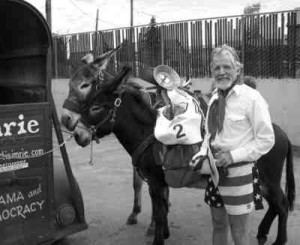Review by Ed Quillen
Colorado History – May 2008 – Colorado Central Magazine
The Principled Politician – The Ralph Carr Story
by Adam Schrager
Published in 2008 by Fulcrum
ISBN 978-1-55591-654-1
IN A TIME OF FEAR, hysteria, and bigotry, Colorado had a governor who stood up for the constitutional rights of American citizens, and he paid a political price for his honorable stand. That governor was Ralph L. Carr, and in The Principled Politician we get a thorough account of his words and actions in that era, as well as a sweeping picture of Colorado politics 70 years ago.
Carr, a gregarious former newspaper editor and practicing attorney, was the Republican candidate for governor in 1938. The Great Depression still afflicted the state, which was $1.2 million in debt. An opponent of the New Deal, Carr promised to cut spending while maintaining essential services. He defeated incumbent Teller Ammons. (Colorado political trivia buffs know this as the first time the two major-party candidates were both natives of the state).
Carr did such a good job that he was overwhelmingly re-elected in 1940 (Colorado governors served two-year terms until 1956), and the Republican nomination for vice-president, running with Wendell Willkie in 1940, was his for the asking.
Carr’s big challenge came in his second term, and it resulted from national and international factors far from Colorado. The West Coast had long been a bastion of anti-Japanese bigotry, and that intensified as relations between the United States and the Japanese Empire deteriorated in the 1930s and into the 1940s.
Many Isei (Japanese who had emigrated to America, some of whom had become citizens) and Nisei (their children, born in America and thus American citizens) began moving away from the West Coast and into interior states like Arizona and Colorado.
The migration intensified after the Japanese surprise attack at Pearl Harbor, Hawaii, on Dec. 7, 1941. There were widespread rumors that ethnic Japanese were a Fifth Column of saboteurs who would assist a Japanese military invasion of the West Coast. Mob violence against them was a real possibility.
The U.S. War Department encouraged the voluntary inland migration. Most affected governors, doubtlessly reflecting the sentiments of their states’ residents, opposed it. “We do not propose to be made a dumping ground for enemy aliens from any other state,” said Arizona Gov. Sidney Osborn, a sentiment amplified by Nels Smith of Wyoming: “There would be Japs hanging from every pine tree.”
Carr was the exception. He told Coloradans that if the War Department wanted ethnic Japanese to move inland, then Colorado was helping the war effort by welcoming them.
The non-citizens among them would be closely monitored by the FBI and other agencies, and the citizens, like any American citizens, had the constitutional right to move about the country and settle where they would.
On Feb. 28, 1942, he gave a statewide radio address, telling Coloradans that “The world’s great melting pot is peopled by the descendants of every nation in the globe. It is not fair for the rest of us to segregate the people from one or two nations and to brand them as unpatriotic or disloyal.”
The state’s newspapers, and most people who wrote to him, did not agree. Carr was accused of turning the state “into a sanctuary for enemies of the American people” since “Japs in the United States are just as much our enemies as are the Japs in Japan.”
Carr didn’t back down in his defense of constitutional rights. “If these people are not to be accorded all the rights and privileges the Constitution gives them, then those same rights and privileges may be denied to you and me six months from now for another just as poor reason as the one which is now offered against the Japanese.”
The voluntary migration turned into a forced evacuation later in 1942. The War Department declared the entire West Coast a military security zone under martial law. That meant the Army could expel anyone, especially all people of Japanese ancestry whether or not they were U.S. citizens, from the West Coast.
They were forced to sell or give away nearly everything they owned. Then they were hauled to “relocation camps” or “internment camps” in the interior. One of the 11 camps was in Colorado, at Amache in Prowers County near the Kansas line.
Carr pointed out that these camps were planned and operated by the federal government, and he had nothing to say about having one in Colorado.
HE RAN FOR THE U.S. Senate in 1942 against Democrat “Big Ed” Johnson, the incumbent and a former governor. It was a good year for Republicans in Colorado — all except Carr. He was the only Republican running statewide who lost.
He went back to practicing law. But by 1950, all was forgiven. There had been no incident of espionage or sabotage by ethnic Japanese in the United States, and the 442nd Regimental Combat Team, filled by Japanese Americans and fighting in Europe, had won more medals than any other American outfit of its size. Carr did not run from his record; he won the Republican nomination for governor, but died on Oct. 2 of a heart attack.
That’s the gist of this book, which covers Carr and the Japanese-American issue in fine and telling detail. We read from scores of letters and newspaper opinions, and there’s a real feel for the passions of the day.
This is not, however, a full biography of Carr. The rest of his life is pretty much glossed over. A native Coloradan, he was born in Rosita in 1877, he edited a newspaper in Victor, he practiced law in several little towns, most notably Antonito, where he taught himself Spanish so he could better serve his clients. He moved to Denver and was appointed U.S. attorney for Colorado. A full biography would tell us a lot more about those years than this book does.
And of course, I found some nits to pick. In Carr’s first term, he called out the National Guard to keep order during a strike by construction workers at Green Mountain Reservoir, on the Blue River about a dozen miles south of Kremmling. Schrager has it that the dam was being built “for local farmers, who for years had wanted the dam to help water their crops.” In fact, Green Mountain was built to insure a water supply for the Shoshone Hydroelectric Plant near Glenwood Springs.
Schrager writes that “Carr’s friend Byrd Fuqua wrote from Nathrop, on Colorado’s eastern plains….” The only Nathrop I know of is certainly not on the eastern plains. Neither is “the tiny town of Lyons on Colorado’s eastern plains.” Nor had Gov. Clarence Morley “lost his re-election bid in 1927,” since the election was in 1926.
But if you take this book for what it is, a detailed and flowing account of the two years when Ralph Carr demonstrated that he was a “Principled Politician” who took the Constitution seriously, then you’ll find some fine and informative reading.
Gov. Carr was one of my heroes when I was a kid — not that I was that into Colorado history then, but because my parents spoke so well of him as a man of principle who supported the rights of all Americans — and now I know in detail why his memory deserves all the honors that have been bestowed.


